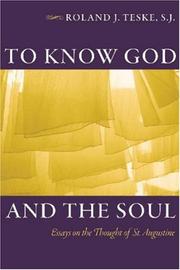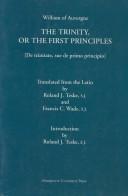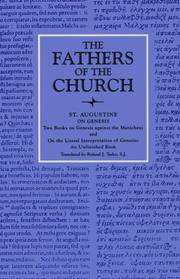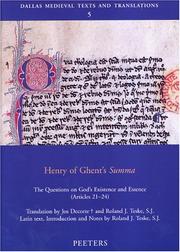| Listing 1 - 10 of 15 | << page >> |
Sort by
|
Book
ISBN: 0874621631 9780874621631 Year: 1996 Volume: 1996 Publisher: Milwaukee (Wis.): Marquette university press,
Abstract | Keywords | Export | Availability | Bookmark
 Loading...
Loading...Choose an application
- Reference Manager
- EndNote
- RefWorks (Direct export to RefWorks)
Augustine established that “the distension of the mind is a necessary condition of our perceiving temporal wholes”. At the same time, as Teske explains, this condition is unnatural to the rational soul and results from original sin.
Time --- History --- Augustine, --- Contributions in concept of time. --- 276 =71 AUGUSTINUS <08> --- -#GOSA:II.P.AU.3 --- Hours (Time) --- Geodetic astronomy --- Nautical astronomy --- Horology --- Latijnse patrologie--Verzamelwerken. Reeksen--AUGUSTINUS --- -Time --- -276 =71 AUGUSTINUS <08> --- #GOSA:II.P.AU.3 --- Avgustin, Blazhennyĭ, --- Augustinus, Aurelius, --- Augustyn, --- Augustin, --- Ughasṭīnūs, --- Agostino, --- Agustí, --- Augoustinos, --- Aurelius Augustinus, --- Augustinus, --- Agustín, --- Aurelio Agostino, --- Episkopos Ippōnos Augoustinos, --- Augoustinos Ipponos, --- Agostinho, --- Aurelli Augustini, --- Augustini, Aurelli, --- Aurelii Augustini, --- Augustini, Aurelii, --- Ōgostinos, --- Agostino, Aurelio, --- אוגוסטינוס הקדוש --- أغسطينوس، --- 奥古斯丁 --- Philosophy. --- Avgustin, --- Augustinus, Aurelius --- Agostinho --- Augustine of Hippo --- Augustine d'Hippone --- Agostino d'Ippona --- Augustin d'Hippone --- Augustinus Hipponensis, sanctus --- Sant'Agostino --- Augustinus van Hippo --- Aurelius Augustinus --- Aurelio Agostino --- 聖アウグスティヌス --- アウグスティヌス --- Augustine --- Time - History - To 500. --- Augustine, - Saint, Bishop of Hippo - Contributions in concept of time. --- Augustine, - Saint, Bishop of Hippo

ISBN: 9780813214870 0813214874 Year: 2008 Publisher: Washington, D.C.: Catholic university of America press,
Abstract | Keywords | Export | Availability | Bookmark
 Loading...
Loading...Choose an application
- Reference Manager
- EndNote
- RefWorks (Direct export to RefWorks)
To Know God and the Soul presents a collection of essays on Augustine of Hippo written over the past twenty-five years by renowned philosopher Roland Teske. They reveal Teske's principal interests in Augustine, especially Augustine's discovery of a spiritualist metaphysics in the philosophy of Plotinus that allowed him to break away from Manichean and Stoic corporealism so that he could conceive of God as incorporeal and non-temporal and of the soul as incorporeal. Augustine's assimilation of Plotinian thought as a means of understanding Catholic Christianity provided key answers to some of the problems that he had had with the Christian faith, but it also led to other problems because some aspects of Platonism were incompatible with the Christian faith, as can be seen in Augustine's early account of the love of neighbor and in his understanding of the motive of creation. The articles focus on Augustine's philosophical thought and language about God, his argument for the existence of God, properties of God such as his substantiality and immutability, the creation of the world in time along with the question raised by the Manichees about what God was doing before he created the world. They tie the definition of time in the Confessions to the concept of a world-soul, which Augustine held at least in the years up to the Confessions. They offer an explanation of the unity of the Confessions, especially through an appeal to Augustine's interpretation of the heaven of heaven, and point to the salvific role of Christ who, according to Augustine, came to free us from time and make us eternal. In addition to a short general introduction, each of the articles is accompanied by a brief reflection in which the author has followed the bishop of Hippo's lead by providing a retractatio, in which he reexamines the articles from his present-day perspective.
Knowledge, Theory of (Religion) --- Augustine, --- Avgustin, Blazhennyĭ, --- Augustinus, Aurelius, --- Augustyn, --- Augustin, --- Ughasṭīnūs, --- Agostino, --- Agustí, --- Augoustinos, --- Aurelius Augustinus, --- Augustinus, --- Agustín, --- Aurelio Agostino, --- Episkopos Ippōnos Augoustinos, --- Augoustinos Ipponos, --- Agostinho, --- Aurelli Augustini, --- Augustini, Aurelli, --- Aurelii Augustini, --- Augustini, Aurelii, --- Ōgostinos, --- Agostino, Aurelio, --- אוגוסטינוס הקדוש --- أغسطينوس، --- 奥古斯丁 --- Avgustin, --- Augustinus, Aurelius --- Agostinho --- Augustine of Hippo --- Augustine d'Hippone --- Agostino d'Ippona --- Augustin d'Hippone --- Augustinus Hipponensis, sanctus --- Sant'Agostino --- Augustinus van Hippo --- Aurelius Augustinus --- Aurelio Agostino --- 聖アウグスティヌス --- アウグスティヌス --- Augustine --- Augustine, - Saint, Bishop of Hippo
Book
ISBN: 9780888443007 0888443005 Year: 2011 Publisher: Turnhout: Brepols,
Abstract | Keywords | Export | Availability | Bookmark
 Loading...
Loading...Choose an application
- Reference Manager
- EndNote
- RefWorks (Direct export to RefWorks)
Faith --- Grace (Theology) --- Redemption --- Sin, Original --- Theology, Doctrinal --- Depravity --- Original sin --- Fall of man --- Religion
Book
Year: 2000 Publisher: Irving (Tex.): American catholic philosophical association,
Abstract | Keywords | Export | Availability | Bookmark
 Loading...
Loading...Choose an application
- Reference Manager
- EndNote
- RefWorks (Direct export to RefWorks)

ISBN: 087462231X 9780874622317 Year: 1989 Volume: 28 Publisher: Milwaukee (Wis.): Marquette university press,
Abstract | Keywords | Export | Availability | Bookmark
 Loading...
Loading...Choose an application
- Reference Manager
- EndNote
- RefWorks (Direct export to RefWorks)
Trinity --- Philosophy, Medieval. --- Early works to 1800. --- -Philosophy, Medieval --- Medieval philosophy --- Scholasticism --- Theology, Doctrinal --- Triads (Philosophy) --- Appropriation (Christian theology) --- God (Christianity) --- Godhead (Mormon theology) --- Holy Spirit --- Trinities --- Tritheism --- Early works to 1800 --- Philosophy, Medieval --- Trinity - Early works to 1800.
Book
ISBN: 0874622336 9780874622331 Year: 1991 Volume: 30 Publisher: Milwaukee (Wis.): Marquette university press,
Abstract | Keywords | Export | Availability | Bookmark
 Loading...
Loading...Choose an application
- Reference Manager
- EndNote
- RefWorks (Direct export to RefWorks)
Immortality --- Soul --- Philosophy, Medieval. --- Christianity --- -Soul --- -Philosophy, Medieval --- Medieval philosophy --- Scholasticism --- Pneuma --- Future life --- Philosophical anthropology --- Theological anthropology --- Animism --- Spirit --- Life after death --- Eschatology --- Immortalism --- Early works to 1800 --- Philosophy, Medieval --- Immortality - Early works to 1800. --- Soul - Christianity - Early works to 1800.
Book
ISBN: 9780874622638 0874622638 Year: 2015 Volume: no. 52 Publisher: Milwaukee, Wisconsin: Marquette university press,
Abstract | Keywords | Export | Availability | Bookmark
 Loading...
Loading...Choose an application
- Reference Manager
- EndNote
- RefWorks (Direct export to RefWorks)
The three articles from Henry of Ghent's Summa of Ordinary Questions translated in this volume are the first that deal with the Trinity. They follow upon Henry's treatment of the divine attributes in articles forty-one to fifty-two. Article fifty-three asks ten questions about the sense in which a person exists in God, and article fifty-four asks ten questions about the emanations or processions of one divine person from another, while article fifty-five asks six questions about the properties or notions of the divine persons. Henry was obviously a voracious reader of the Fathers of the Church and the medieval masters of theology in the centuries before him. He cites extensively from Ambrose of Milan, Augustine of Hippo, Boethius, Hilary of Poitiers, Anselm of Canterbury, Peter Lombard, Richard of Saint Victor, and Thomas Aquinas among Western Latin fathers and theologians and from Pseudo-Dionysius and John of Damascus among the Eastern or Greek fathers. But besides such well-known thinkers he cites other masters who are less well-known, such as Praepositinus, Simon of Tournai, Gerard La Pucelle, and Giles of Rome. Henry also quotes such philosophers as Aristotle, Porphyry, and Averroes, who of course have little to say on the Trinity. Brief introduction to the questions that Henry discusses in each of the three articles: In article fifty-three Henry first of all situates the following questions within his Summa of Ordinary Questions and explains that he will firstly deal with the persons in general in articles fifty-three and fifty-four and then withthe properties or notions of the persons in article fifty-five. Article fifty-three discusses "the manner of the being of persons in God" and article fifty-four is concerned with "the manner of one person's emanating from another."Article fifty-three has ten questions, the first of which is whether one needs to hold that there is a person in God. In his resolution of the question Henry appeals to what he previously established, namely, that we "must attribute to God whatever is without qualification more worthy or better to be than not to be." Appealing to the authority of Richard of Saint Victor, Henry argues that "person" signifies something incommunicable in a rational or intellectual nature and is something of dignity and nobility. Hence, we must hold that there is a person in God.
Philosophische Theologie. --- Trinitätslehre. --- Philosophical theology. --- Trinity --- Medieval philosophy

ISBN: 0813211840 9780813211848 0813200849 9780813200842 9780813210889 0813210887 Year: 1991 Volume: 84 Publisher: Washington (D.C.): Catholic university of America press,
Abstract | Keywords | Export | Availability | Bookmark
 Loading...
Loading...Choose an application
- Reference Manager
- EndNote
- RefWorks (Direct export to RefWorks)
Manichaeism --- Dualism (Religion) --- Philosophy, Ancient --- Christianity --- Bible. --- Be-reshit (Book of the Old Testament) --- Bereshit (Book of the Old Testament) --- Bytie (Book of the Old Testament) --- Chʻangsegi (Book of the Old Testament) --- Genesis (Book of the Old Testament) --- Sifr al-Takwīn --- Takwīn (Book of the Old Testament) --- #GOSA:II.P.AU.2 --- #GROL:SEMI-276<08> Fath 84 --- 222.2 --- 273.21 --- 273.21 Manicheïsme --- Manicheïsme --- Genesis --- Manichaeism - Controversial literature - Early works to 1800.
Book
ISBN: 9783700166115 3700166117 Year: 2009 Volume: 97 Publisher: Wien: Verlag der Österreichischen Akademie der Wissenschaften,
Abstract | Keywords | Export | Availability | Bookmark
 Loading...
Loading...Choose an application
- Reference Manager
- EndNote
- RefWorks (Direct export to RefWorks)
Christian theology --- Prosper of Aquitaine --- Predestination --- God --- Prédestination --- Dieu --- Early works to 1800. --- Will --- Ouvrages avant 1800 --- Volonté --- Salvation --- Grace (Theology) --- Salvation outside the Catholic Church --- Semi-Pelagianism --- Universalism --- Particularism (Theology) --- Debates, etc --- Prosper, --- Prédestination --- Volonté --- Christian literature, Early --- Pelagianism --- Salus extra ecclesiam --- Universal salvation --- Salvation after death --- Catholic Church and salvation --- Election (Theology) --- Metaphysics --- Misotheism --- Monotheism --- Religion --- Theism --- Latin authors --- Christianity --- Ambrose, --- Leo --- Predestination - Early works to 1800 --- God - Will - Early works to 1800 --- Salvation - Early works to 1800 --- Grace (Theology) - Early works to 1800 --- Salvation outside the Catholic Church - Early works to 1800 --- Semi-Pelagianism - Early works to 1800 --- Universalism - Debates, etc - Early works to 1800 --- Particularism (Theology) - Early works to 1800 --- Prosper, - of Aquitaine, Saint, - approximately 390-approximately 463 - De vocatione omnium gentium

ISBN: 9042915900 9789042915909 Year: 2005 Volume: 5 Publisher: Paris: Peeters,
Abstract | Keywords | Export | Availability | Bookmark
 Loading...
Loading...Choose an application
- Reference Manager
- EndNote
- RefWorks (Direct export to RefWorks)
This volume offers a translation with introduction and notes of Henry of Ghent's questions on the being and essence of God from his Summa of Ordinary Questions (Summa quaestionum ordinarium). These questions form the heart of Henry's philosophy of God, especially his "new way" of proving the existence of God and his claim that God is the first object known by the human intellect.
Christian fundamental theology --- Beschavingsgeschiedenis --- Filosofie van de Middeleeuwen --- Geschiedenis van de Middeleeuwen --- Histoire des civilisations --- Histoire du Moyen Age --- Littérature médiévale --- Middeleeuwse letterkunde --- Philosophie du Moyen Age --- God (Christianity) --- Dieu (Christianisme) --- History of doctrines --- Sources --- Histoire des doctrines --- Henry, --- God (Christianity) - Early works to 1800 --- Henry, - of Ghent, - 1217-1293
| Listing 1 - 10 of 15 | << page >> |
Sort by
|

 Search
Search Feedback
Feedback About UniCat
About UniCat  Help
Help News
News